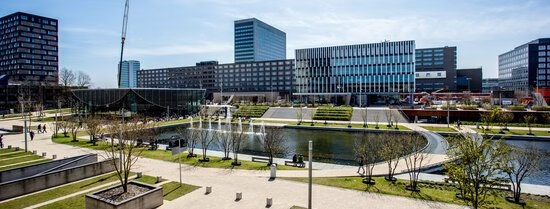Did you know that in Europe, Neurological Disorders (NDs), such as autism spectrum disorders and epilepsy, affect 41 million people? Their treatment accounts for 35% of the total disease burden in Europe, with a yearly cost of €798 billion. Would you be surprised to learn that, despite NDs significant impact on both patients and health systems, comprehensive treatments for NDs are lacking?
This is exactly what the Integrative Neuromedicine research team lead by Dr. Daan Brinks (TU Delft); Dr. Zhenyu Gao (Erasmus MC), and Dr. Maren Wehrle (EUR) hope to improve through their Convergence Health & Technology Flagship program award of two million euro.
In simple terms, the brain can be studied from the molecular and cellular level (as through biology/genetics) to the organ (brain as whole organ with specific functions) to the phenomenological level (a human/patient with a brain and consciousness/experience). Specialised researchers from many different disciplines have studied the brain extensively within their own expertise areas. But it can be particularly challenging to connect individual specialised data from different disciplines - with completely different tasks and methodologies - to each other.
What makes this project unique - and the first of its kind - is that it seeks to find a common, integrative research approach from the beginning. The researchers hope that by investigating the changing/developing brain from different perspectives, they will be able to link these different perspectives and enable a shortcut/direct line from fundamental brain research to the clinical treatment of patients.
Dr. Maren Wehrle, Erasmus School of Philosophy: “Philosophy is crucial to link these different levels and approaches, as it is concerned with a more comprehensive understanding of the human being, as mind, body, and brain. It can therefore provide useful conceptual reflection and differentiation on topics such as consciousness, the mind, experience, and how this might be related to the brain. By better understanding the brain and its changes, and including the perspective of the patient’s experience, we can develop more successful and personalised treatments for NDs. Treatments that are more tailor-made to patient’s fears, needs and habits are more easily accepted and integrated into their daily lives.”
Convergence flagship program Health & Technology
The Convergence collaboration between Erasmus University Rotterdam, Erasmus MC and TU Delft is continuing to take shape. One of the themes is Health & Technology (H&T). The H&T Flagship Program stimulates cooperation between the universities, disciplines and societal partners, with the aim of solving major societal problems. In this project, Integrative Neuromedicine (IN), researchers from medical sciences and philosophy work together to decrease the negative impact NDs have on people’s lives. The Erasmus University Campus Woudestein team consists of Dr. Maren Wehrle and Dr. Katharina Bauer from the Erasmus School of Philosophy, and Prof. Ingmar Franken and Prof. Matthias Wieser from the Erasmus School of Social and Behavioural Sciences.

